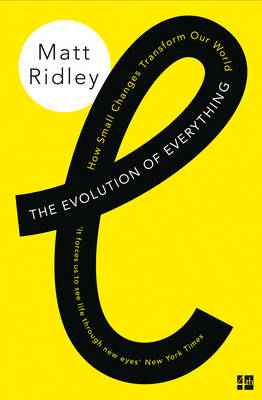24%OFF

Stock image for illustration purposes only - book cover, edition or condition may vary.
The Evolution of Everything: How Small Changes Transform Our World
Matt Ridley
€ 13.99
€ 10.63
FREE Delivery in Ireland
Description for The Evolution of Everything: How Small Changes Transform Our World
Paperback. We are taught that the world is a top-down place. Acclaimed author, Matt Ridley, shows just how wrong this is in his compelling new book. Num Pages: 400 pages. BIC Classification: HBTB; JFCX. Category: (G) General (US: Trade). Dimension: 197 x 130. .
`If there is one dominant myth about the world, one huge mistake we all make ... it is that we all go around assuming the world is much more of a planned place than it is.' From the industrial revolution and the rise of China, to urbanisation and the birth of bitcoin, Matt Ridley demolishes conventional assumptions that the great events and trends of our day are dictated by those on high. On the contrary, our most important achievements develop from the ground up. In this wide-ranging and erudite book, Matt Ridley brilliantly makes the case for evolution as the force that has shaped much of our culture, our minds, and that even now is shaping our future. As compelling as it is controversial, as authoritative as it is ambitious, Ridley's deeply thought-provoking book will change the way we think about the world and how it works.
Product Details
Publisher
HarperCollins Publishers
Format
Paperback
Publication date
2016
Condition
New
Number of Pages
368
Place of Publication
London, United Kingdom
ISBN
9780007542475
SKU
V9780007542475
Shipping Time
Usually ships in 5 to 9 working days
Ref
99-44
About Matt Ridley
Matt Ridley received his BA and D. Phil at Oxford researching the evolution of behaviour. He has been science editor, Washington correspondent and American editor of The Economist. He is the author of bestselling titles The Red Queen (1993), The Origins of Virtue (1996), Genome (1999) and Nature via Nurture (2003). His books have sold over half a million copies, been translated into 25 languages and been shortlisted for six literary prizes. In 2004 he won the National Academies Book Award from the US National Academies of Science, Engineering and Medicine for Nature via Nurture. In 2007 Matt won the Davis Prize from the US History of Science Society for Francis Crick: Discoverer of the Genetic Code. He is married to the neuroscientist Professor Anya Hurlbert.
Reviews for The Evolution of Everything: How Small Changes Transform Our World
`He argues we live in a bottom-up world...a compelling argument and in this fascinating work, an evolution from Ridley's other books, such as The Rational Optimist of The Origins of Virtue, he takes it to all realms of knowledge and how new ideas emerge... Ridley has amassed such a weight of fascinating evidence and anecdote that the pages fly by' Ed Conway, The Times `Intriguing and artfully argued' Ian Critchly, The Sunday Times `This is a book of remarkable scope (when Ridley says everything, he isn't exaggerating), clearly written by a polymath who reads whatever is interesting, old and new. What's more, it does not have the feel of a book written on commission so much as one that has been slowly assembling its own emergent thesis over time, tentatively testing and sometimes rejecting ideas along the way. As so often in nature, something wonderful has thereby come about' Literary Review `The book displays his wide and deep knowledge of many different fields. It is fast paced and elegantly written. Few readers will come away without fresh information and a challenge to their preconceptions' Prospect `Readable, provocative and infuriating' New Statesman Praise for Matt Ridley: `What a superb writer he is, and he seems to get better and better.' Richard Dawkins, author of `The Selfish Gene' Praise for `The Rational Optimist': `A triumphant blast on the vuvuzela of common sense' Boris Johnson `A glorious defence of our species... a devastating rebuke to humanity's self-haters' Sunday Times `No other book has argued with such brilliance against the automatic pessimism that prevails' Ian McEwan `His theory is, in a way, the glorious offspring that would result if Charles Darwin's ideas were mated with those of Adam Smith' The Economist `As a work of bold historical positivity it is to be welcomed. At every point cheerfulness keeps breaking through' The Times
